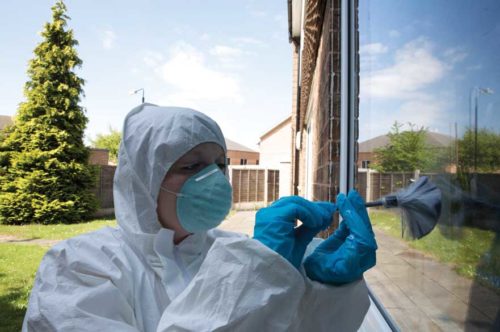Overview
If your attention to detail is unmatched you could be destined for life in investigation. This degree will get you there.
Forensic investigation is an exciting and challenging area of study, which involves not only an understanding of scientific methods of forensic analysis, but also investigative techniques, including the interpretation and presentation of analytical evidence to explain or solve criminal or civil cases.
Officially recognised by Skills for Justice for the quality of our teaching, our degree is concerned primarily with the identification, collation and reporting of evidence to a forensic hearing. Our comprehensive curriculum covers investigative skills, the law, interviewing techniques, forensic science, investigation management, the legal process of enquiry, crime scene analysis, fraud investigation, digital forensics, surveillance and the evaluation of evidence.
We run a range of interesting fieldtrips, which have previously included visits to the mortuary at the Coventry University Hospital and Specialist Group International, a world-renowned company which provides 24/7 specialist response to police, fire and other government agencies and boasts an arsenal of cutting-edge equipment. These industry visits contribute to our high levels of student satisfaction – 93% overall and 98% for teaching in the latest National Student Survey (NSS) 2016.
Course information
This multidisciplinary degree encourages you to apply essential elements of psychology, criminology, law, forensic science and computing to conduct and report investigative analysis, using photography, video and other evidence-based techniques.
Although we cover the essentials of forensic science, our degree is not intended to be a forensic science course. Instead, we seek to broaden your perspective by providing a broad understanding of both forensic science and forensic investigation. You’ll not only study the ‘hard science’, namely the scientific side of scene analysis for evidence collection, but also the use of interview techniques, witness testimony and covert surveillance, for example, in the collection of evidence.
Why choose this course?
Multidisciplinary in its approach, this course brings together a range of important disciplines within investigative processes – digital forensics, social media, fraud, photography and sociology in criminal and civil investigations.
Our teaching team currently has a wide range of professional experience and includes a qualified solicitor, trained barrister and senior investigating police officers, as well as expertise in surveillance and investigative interviewing, pathology, fraud and financial investigations. They have links with a range of investigative agencies, including local police forces, support organisations and specialist investigators, some of whom have offered placements to students.
We focus on providing a practical experience, using real-life case studies and scenarios, as well as traditional academic approaches. We aim to host regular guest lectures led by investigative professionals who provide specialist and up-to-date knowledge and understanding of their particular fields. For example, recent talks have looked at offender profiling, geographic profiling, pathology, digital forensics, computer reconstructions, rape and sexual assault.
International experience opportunities
A number of the modules contain a comparative focus on international investigative and procedural matters. These include evidence gathering, forensic computing and policing studies. In addition, as part of the Forensic Casebook module, there are workshops concerning a number of cases with international dimensions, including a manslaughter case when premises were destroyed to facilitate a fraudulent insurance claim but inadvertently killed an occupant. The case originated in the UK but culminated with a trial in a foreign country involving a non-British judicial system.
Students have opportunities to participate in Online International Learning (OIL) projects with the University of Malta, University of Windsor, Ontario, Canada and the University of Seville. We also have student exchange agreements with these universities enabling you to study there for one semester or even a whole year.
Each year, we organise a subsidised trip to Europe, which has previously included visits to the: International Criminal Court and Peace
Career prospects
Successful completion of this course will support you to develop a wide range of skills in the collection, analysis and interpretation of physical evidence, all of which are useful for a diverse range of careers in areas such as the intelligence services, insurance companies, banking, the prison service, accountancy firms, trading standards, fraud investigation organisations, social care, environmental or financial services and teaching.
Coventry University is committed to preparing you for your future career and giving you a competitive edge in the graduate job market. The University’s Careers and Employability team provide a wide range of support services to help you plan and prepare for your career.
Zobacz więcej na stronie uniwersytetu >>
Wiza studencka do Wielkiej Brytanii
Aby studiować w Wielkiej Brytanii potrzebujesz wizy studenckiej. Aby złożyć wniosek o taką wizę studencką musisz zdjać certyfikat językowy na poziomie B2.
Uważaj! Do celów wizowych musisz wybrać wyłącznie egzamin w wesji Secure English Language Test (SELT) UKVI .
Co to jest test SELT UK VI registration? Przeczytaj więcej o testach SELT UKVI >>










 , organizują spotkania, wycieczki, webinary. Wszystko, by każdy zainteresowany otrzymał całą niezbędną wiedzę. Polecam!
, organizują spotkania, wycieczki, webinary. Wszystko, by każdy zainteresowany otrzymał całą niezbędną wiedzę. Polecam! 

 dzięki Wam udało się zrobić wszystko na czas i mogę być spokojna. Kontakt świetny, pomoc nieoceniona. Odpowiedzą na każde pytanie i pomogą we wszystkim co potrzebne! Polecam :)
dzięki Wam udało się zrobić wszystko na czas i mogę być spokojna. Kontakt świetny, pomoc nieoceniona. Odpowiedzą na każde pytanie i pomogą we wszystkim co potrzebne! Polecam :)








